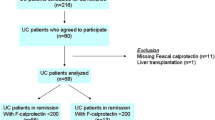Abstract
Introduction
We aimed to determine the prevalence and duration of prodromal periods in patients with celiac disease and inflammatory bowel disease (Crohn’s disease and ulcerative colitis). Furthermore, we explored to what extent vague abdominal symptoms consistent with both disorders were attributed to irritable bowel syndrome (IBS) and if the presence of prodromal IBS (P-IBS) had an impact on prodrome duration.
Methods
In the study, 683 biopsy-proven patients (celiac n = 225, ulcerative colitis n = 228, Crohn’s disease n = 230) completed a postal survey including an assessment of prodromal periods and IBS symptoms during both the prodrome and at present (achieved by completion of the ROME II criteria). Results were compared to age/sex-matched controls (n = 348).
Results
Crohn’s disease patients had the highest prevalence of prodromes (94%) in comparison to ulcerative colitis (48%) and celiac disease (44%). However, Crohn’s disease patients have the lowest prevalence of P-IBS (29%) in comparison to ulcerative colitis (38%) and celiac disease (67%). Prodrome duration in patients with P-IBS Crohn’s disease was 4 years in comparison to 2 years without (p = 0.018). Prodrome duration in P-IBS celiac disease was 10 years in comparison to 7 years without (p = 0.046). Prodrome duration in patients with ulcerative colitis was not affected by P-IBS (p ≥ 0.05). Age and sex were not confounding factors.
Conclusions
This is the first study to make direct comparisons of prodrome periods between celiac disease and IBD. Prodrome duration in celiac disease is significantly longer and more often characterized by P-IBS than IBD. In celiac disease and CD, P-IBS increases prodrome duration. This may represent a failure to understand the overlap between IBS and celiac disease/IBD.

Similar content being viewed by others
References
Sanders DS, Hurlstone D, Stokes R, Rashid F, Milford-Ward A, Hadjivassiliou M. Changing face of adult celiac disease: experience of a single university hospital in South Yorkshire. Postgrad Med J. 2002;78:31–33.
Cranney A, Zarkadas M, Graham ID, et al. The Canadian Celiac Health Survey. Dig Dis Sci. 2007;52:1087–1095.
Pimentel M, Chang M, Chow E, et al. Identification of a prodrome period in Crohn’s disease but not ulcerative colitis. Am J Gastroenterol. 2000;95:3462–3558.
Pieper C, Haag S, Gesenhues S, Gerken G, Jockel K. Guideline adherence, patient satisfaction in IBD—an evaluation study. BMC Health Serv Res. 2009;27:9–17.
Burgmann T, Clara I, Graff L, et al. The Manitoba Inflammatory Bowel Disease Cohort Study: prolonged symptoms before diagnosis—how much is irritable bowel syndrome? Clin Gastroenterol Hepatol. 2006;4:614–662.
Dickey W, McConnel J. How many hospital visits does it take before celiac sprue is diagnosed? J Clin Gastroenterol. 1996;23:21–23.
Lo W, Sano K, Lebwohl B, Diamond B, Green PH. Changing presentation of adult celiac disease. Dig Dis Sci. 2003;48:395–398.
Hauser W, Gold J, Stallmach A, Caspary WF, Stein J. Health-related quality of life in adult celiac disease in Germany: results of a national survey. Euro J Gastroenterol Hepatol. 2006;18:747–754.
Hopper A, Hadijvassilou M, Butt S, Sanders DS. Adult celiac disease. BMJ. 2007;335:558–562.
Xavier R, Podolsky D. Unravelling the pathogenesis of IBD. Nature. 2007;427–435.
Thompson WG, Longstreth GF, Drossman DA. Functional bowel disorders and functional abdominal pain. GUT. 1999;45:1143–1147.
Corazza GR, Brusco G, Andreani ML, Biagi F, Stefano MD, Gasbarrini G. Previous misdiagnosis, diagnostic delay in adult celiac sprue. J Clin Gastroenterol. 1996;22:324–325.
Mearin F, Badia X, Balboa A, et al. IBS prevalence varies enormously depending on the employed diagnostic criteria: comparison of ROME II versus previous criteria in a general population. Scand J Gastroenterol. 2001;36:1155–1161.
Kumar P, Clarke M. Clinical Medicine. 5th ed. London: Churchill Livingstone.
Zipser R, Farid M, Baisch D, Patel B, Patel D. Physician awareness of celiac disease: a need for further education. J Gen In Med. 2005;20:644–646.
O’Leary C, Wieneke P, Buckley S, O’Regan P, Cronin P, Quigley E. Celiac disease and irritable bowel-type symptoms. Am J Gastro. 2002;97:1463–1467.
Keohane J, O’Mahony C, O’Mahony L, O’Mahony S, Quigley EM, Shanahan F. Irritable bowel syndrome-type symptoms in patients with inflammatory bowel disease: a real association or a reflection of occult inflammation? Am J Gastroenterol. 2010;105:1789–1794.
Long MD, Drossman DA. Inflammatory bowel disease, irritable bowel syndrome, or what? A challenge to the functional-organic dichotomy. Am J Gastroenterol. 2010;105:1789–1794.
Mein SM, Ladabaum U. Serological testing for coeliac disease patients with symptoms of irritable bowel syndrome: a cost effectiveness analysis. Aliment Pharmacol Ther. 2004;19:1–12.
Biesiekieski TR, Newnham ED, Irving PM, et al. Gluten causes gastrointestinal symptoms in subjects without celiac disease: a double-blind randomised placebo-controlled trial. Am J Gastroenterol. 2011;106:508–514.
Author information
Authors and Affiliations
Corresponding author
Rights and permissions
About this article
Cite this article
Barratt, S.M., Leeds, J.S., Robinson, K. et al. Prodromal Irritable Bowel Syndrome May Be Responsible for Delays in Diagnosis in Patients Presenting with Unrecognized Crohn’s Disease and Celiac Disease, but Not Ulcerative Colitis. Dig Dis Sci 56, 3270–3275 (2011). https://doi.org/10.1007/s10620-011-1783-y
Received:
Accepted:
Published:
Issue Date:
DOI: https://doi.org/10.1007/s10620-011-1783-y




